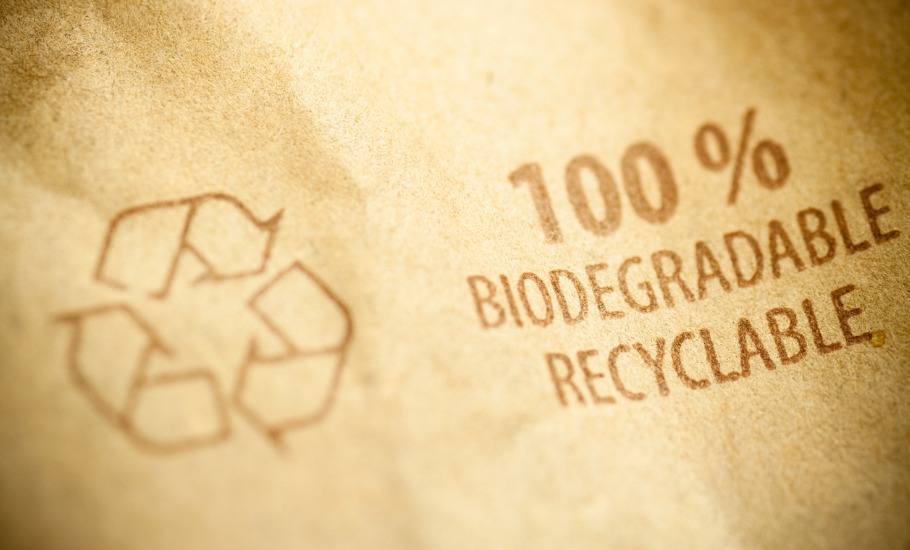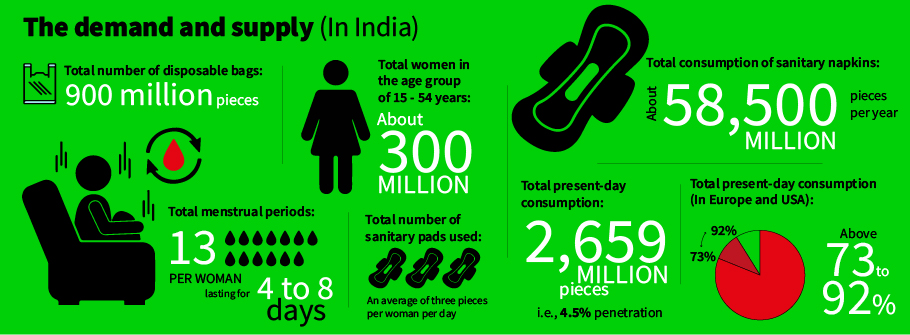
Bio bags for sanitary pads disposal unlikely to be sustainable solution
Even as the Centre has decided to make sanitary napkin manufacturers provide disposal biodegradable bags from January 2021, doubts on how effective the measure would be, given the products are non-bio degradable, still remains.

Even as the Centre has decided to make sanitary napkin manufacturers provide disposal biodegradable bags from January 2021, doubts on how effective the measure would be, given the products are non-bio degradable, still remains.
The decision comes in the wake of constant appeals made to the makers of menstrual hygiene products to come up with eco-friendly biodegradable bags going unheeded.
However, this isn’t the first time that the topic of menstrual waste is being addressed by the government. The Solid Waste Management Rules 2016 acknowledged that waste generators must put ‘the used sanitary waste like diapers, pads etc., in the pouches provided by the manufacturers or brand owners of these products or in a suitable wrapping material and shall place the same in the bin meant for dry waste/non‐biodegradable waste.’
Related news: Sanitary pad disposal bags mandatory from January 2021, says Javadekar
The same rules also specify that ‘all such manufacturers, brand owners or marketing companies shall educate the masses for wrapping and disposal of their products.’
In the past few years, while efforts are being made by stakeholders including the government and civil society to empower girls and women to adopt safe and clean menstrual practices, there is also a raging concern on the methods of disposal of the sanitary waste.


Ganga Sridhar, an eco-warrior from Chennai, has been spreading awareness to regarding the same to several residents via her group Eko Konnectors, to orient them on the best ways to segregate day-to-day waste.
“If the concern is about the disposal methods, we already have a solution in the form of paper bags and newspaper bags and marking them with a red dot before throwing them in the bin, asking manufacturers to come up with disposal biodegradable bags will not help, as the waste inside is non-biodegradable,” she said.
Related news: Menstrual cups: Why India is so uncomfortable with this bloody brilliant idea
The move aims to make the handling of the waste safe for the sanitary workers transporting them to the landfills, said ecologist Sultan Ahmed Ismail.
“The biodegradable plastic can only decompose in a temperature of 60 degrees Celsius. So are they going to be into the landfills where this temperature can be maintained?” he said, adding that “The other option is corn starch bags that I wouldn’t recommend because these thrive on food items.”
Bioplastics, a viable alternative?
Bags made of Polylactic Acid or PLA plastic, also known as bioplastic are a sought-after alternative. However, bioplastic or biodegradable plastic is also a tag used for many products that are not essentially biodegradable.
“Most of these products just break down into smaller fragments, when biodegradability is actually a biological reaction, where the fragments are consumed by microorganisms in a certain infrastructure,” pointed out Dr Sundar Balakrishnan, managing director, Nature Tech India Private Limited, a company manufacturing bioplastic.
Used as packaging material for food and consumer goods, he reckoned that bioplastics are good when the application lifespan is short.
Related news: Time for men to talk about it. Period
In the current scenario, there are varying definitions for bio-degradable plastics, said TS Padmapriya, chief executive India, Sanitation First UK, an organisation that has been working in the field of health and sanitation through their projects that address menstrual health.
“What is the time taken for them to break down? In what environment are they biodegradable — industrial or lab? As of today this is not mentioned in any material. When people say compostable or biodegradable, the consumer standards have be mentioned on the bags,” she explained.
Encourage small industries providing green options
Padmapriya also bats for reusable products that do not take a toll on the environment. “There are incinerators used in several schools, where the health and safety of the child becomes a question. In such situations, it is best to opt for reusable ones,” she said.
While there are some women entrepreneur groups that have been engaged in making biodegradable, and reusable pads, they constitute a minuscule percentage, said Ganga, adding that the products are available either online or in pop-up shops.
Related news: CRPF gets sanction to install sanitary pad dispensers for women in combat
“These are products from biodegradable products like banana fibre, pinewood fibre, etc. However, these are not readily available, the government should encourage them to occupy more space in the markets. In an agro-based society like India, those researching on such options also have to be given a boost,” she pointed.
Ismail concurs with Ganga on when options like newspapers are being explored, putting the onus on product makers will only make the products expensive. “They are not going to offer it free of cost and will pass on the costs to the customers. These products are already quite expensive,” he concluded.

